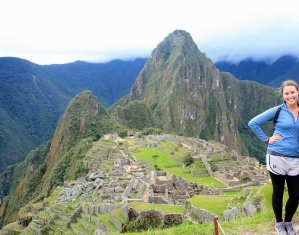From Forbes Website: No More Coffee Runs: Two Years Of Service With The Peace Corps
Forbes: No More Coffee Runs: Two Years Of Service With The Peace Corps

by Alexandra Talty
Created in 1961 by former President John F. Kennedy, the United States Peace Corps holds an allure for many. While some might balk at the concept of making a two-year commitment, others consider it as one of the coolest things about being an American.
And for anyone who is interested in development, the Peace Corps offers an entre into the highly-competitive world of international aid work. Something of a catch-22, most international NGOs require applicants to have experience in the field. Luckily for Americans, we have the Peace Corps.
“My exposure to this life and this world was extremely limited until college,” says Wendy MacClinchy, Head of Resident Coordinator Office at the United Nations in Lebanon. “There wasn’t a lot of knowledge about what I felt was a kind of calling. When I had heard of the Peace Corps, I knew it was a natural fit.”
Outside of gaining valuable field experience that helped her land her next job in Afghanistan, MacClinchy also believes that one of the benefits of the Peace Corps is to help Americans gain international job experience, in terms of acquiring languages, working with different systems of government and broadening cultural horizons.
[The Peace Corps’ three goals are] good pillars for preparing Americans to better engage socially and productively on a global level,” says Paul Guggenheim, who was a Peace Corps Volunteer in Honduras in 1997. He worked in the sanitation and water sector, and was inspired by his work to pursue development work in Guatemala and most recently, the Dominican Republic.“Peace Corps isn’t just about development work, it is also about cultural exchange,” agrees Emily McGinnis, a current Peace Corps Volunteer in Cabanaconde, Peru. Some of the new cultural skills McGinnis has picked up? De-graining and de-husking corn.
“It’s become sort of a hobby,” she says with a laugh, explaining how she helps her host mom with the process. She has also learned a local dance, Wititi, and ran a half marathon.
“Notions of friendship become very unconventional,” says McGinnis, when speaking about living in a town with a population of 3,000. “I wouldn’t have expected to be friends with a 45-year-old woman with a toddler or a 10 year old kid.”
And part of the Peace Corps’ value is that opportunity to delve into new experiences.

PCV Emily McGinnis in Peru
“You really get to explore who you are in the context of exploring this other country. When else in your life do you have this freedom?,” says MacClinchy. “There is no way you can really know what it will be like before you go in. If you take that enormous leap of faith in the beginning, you are paid back in spades.”
She adds, “You are going to have a wild adventure. One that you would never have doing data entry or being entry level in whatever career you aspired to be in, getting coffee like a lackey at a law firm? Do you want to get coffee for the next two years? Or do you want to climb mountains and change peoples lives and bring people water?”
And although changing people’s lives sounds exciting, all of the PCVs I spoke with emphasized the importance of patience when it comes to seeing the progress of initiatives.
“The optimism and sort of naiveté that represents the twentysomething entry into a career path was tempered during that time, obviously, with the reality of community-based development,” says MacClinchy, when speaking about her personal successes with Peace Corps initiatives at her site. “You can’t impose ideas of modernity of development, they have to come from the grassroots. You can’t implant ideas, they have to be organically developed. At the technical level, in terms of the impact I had, there were real disappointments. Especially since I was evacuated at the very end of it and didn’t have proper closure.”
MacClinchy was evacuated from Morocco when the United States invaded Iraq in 2003. The issues that she had tried to tackle included female literacy, access to running water and electricity. Although when she left abruptly none of her goals had been accomplished, in the years since MacClinchy has been fortunate enough to return to her site.
MacClinchy recalls one of her most recent visits, saying “One of my neighbors told me to sit down. She took out a piece of paper and I said ‘what do you want me to write for you’ and she said, ‘no, I am going to write for you.’ And she looked at me and laughed and she wrote her name. Even now I get choked up,” says MacClinchy. On her last visit there was also running water and limited electricity.
“The seeds of development take a lot of time to take root, to be encouraged, to grow. Going to see the effects afterwards to me was the most important part of all,” she adds.
McGinnis, who is finishing up her second year in the Peace Corps and has been selected to continue her service another year as a volunteer coordinator says that the flexibility can be great because it gives you freedom to create programs that are interesting to you, inside the general Peace Corps framework.
“You are responsible for what you want to do. What you put into it is what you get out of it,” says McGinnis. The millennial recently taught a journaling class while one of her counterparts at another site taught comic books to youth. However, she cautions about trying to force programs that your community might not be interested in.
“You can try a million things and be super persistent but sometimes things just don’t work,” says McGinnis. She goes on to explain that when she first arrived in Peru, she wanted to engage in environmental development work at her site. The Georgetown graduate tried to organize community gardens and workshops. However, residents of Cabanaconde were not interested.
“I had to realize this isn’t about me. This is about this community and what they need and want. You need to take a piece of humble pie and step back,” says McGinnis. She ended up working more on women’s initiatives and education about domestic violence. The native Rhode Islander also discovered a love of working with children.
It is important to keep an open mind both about the work that is accomplished as well as the goals of your service. For some volunteers, the cultural exchange formed the most profound part of the two years of service.
“The later stages of my training was when 9/11 happened. Morocco, which is where I served, was one of only two Muslim or Arab countries where the Peace Corps still operated in at the time,” says MacClinchy. “We had a few weeks of Arabic under our belts and we had to watch the news on really small, black and white TV attached to a car battery. The whole village was gathered around watching again and again the pictures of the towers falling.”
“Those of us that stayed, I think we understood that the nature of our work would fundamentally be changed by what had happened and this new relationship between America and the Arab World, between the Christian West and the Muslim East. It changed everything for us,” says MacClinchy. “It was this profound understanding that we were ambassadors in a way, at a time, that was much more important than a project.”
Alexandra Talty is a free lance journalist currently living in Las Terrenas, Dominican Republic. Previously she worked for Forbes.com. Her blog is The Middle Of Time. She can be reached at actalty@gmail.com
No comments yet.
Add your comment